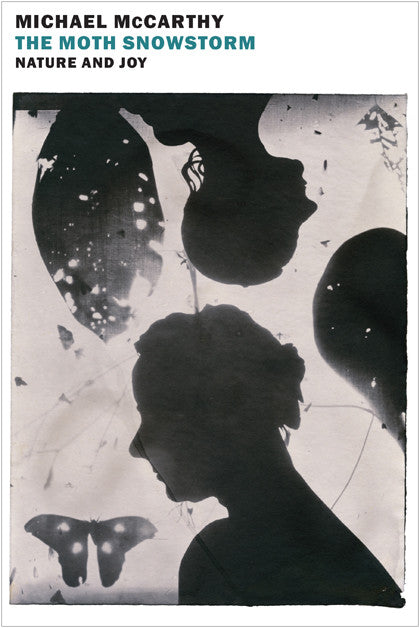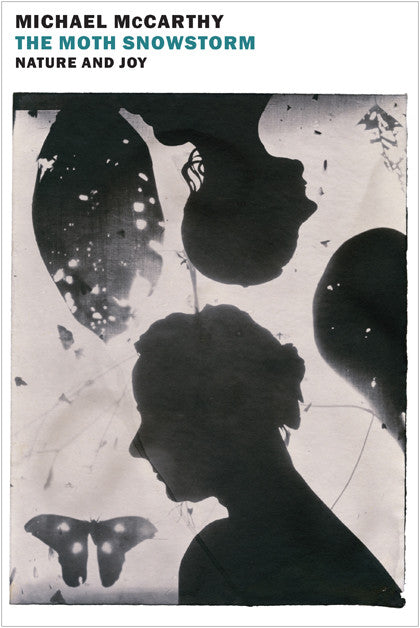McCarthy takes his readers on an idiosyncratic and wonderful walk through his joy of nature. Like some of the greatest nature books, from Thoreau’s ‘Walden' to Annie Dillard’s 'Pilgrim at Tinker Creek,' it’s a personal book that describes McCarthy’s own journey while at the same time folding his experiences within a broader context….'The Moth Snowstorm' is an inspiring book, and I salute McCarthy for his boldness. Rather than the dire, dry statistical projections often heralded to make the case for conservation, he turns boldly to joy — to imagination and emotion.
—Andrea Wulf, The New York Times Book Review
Terrific, original work.
—Michael Pollan, author of The Omnivore's Dilemma and In Defense of Food
Mr. McCarthy is certainly a personable companion, prone to bursts of eccentric charm…Filled with beautiful writing…The Moth Snowstorm, however, is much more than a paean to the Earth’s beauty. It is also an elegy for it, and a particularly distressed one at that.
—Jennifer Senior, The New York Times
McCarthy’s not a poet, but he can write like one. He can also see nature the way poets do. He believes that this kind of seeing is the only thing that’s going to save nature from destruction caused by overdevelopment, climate change, and pesticides.
—Diane Scharper, National Catholic Reporter
An environmental call to arms as powerful as Silent Spring.
—The Conversation (UK)
A chronicle that is both bleak and achingly beautiful; a true treasure.
—Booklist
In this mesmerizing combination of memoir, treatise, and paean to the natural world, British environmental writer McCarthy (Say Goodbye to the Cuckoo) weaves the personal with the political and the local with the global to create a compelling examination of Earth’s current ecological crisis...his writing is beautiful, sincere, and powerful.
—Publishers Weekly, starred review
[McCarthy is] as approachably learned on his subject as you'd expect a longtime environmental correspondent to be; but his sentences are long and sensuous—great sauntering accumulations of clauses and images, heaving with a poetic yearning to capture the passing abundance of the natural world.
—Mark O'Connell, Slate
A heartfelt, lovely, and thoroughly lived-through meditation on the natural world and its central part in any civilized life.
—Kirkus
A beautifully lyrical work, dealing with one of the most urgent problems of our age.
—Tim Flannery
McCarthy has for years been the doyen of environmental correspondents...conversant with the hard facts, the political realities and the moral complexities of the conservation world. But he writes also as a man inspired by the beauty, diversity and abundance of the natural world that we are destroying. This combination of worldly wisdom and deeply felt personal experience makes this a highly original and refreshing account of our current predicament.
—Jeremy Mynott, The Times Literary Supplement
In his beautiful book The Moth Snowstorm, Michael McCarthy suggests that a capacity to love the natural world, rather than merely to exist within it, might be a uniquely human trait. When we are close to nature, we sometimes find ourselves surprised by joy....
—George Monbiot, The Guardian
This is a book about the joy the natural world can engender—even in the face of its decline. McCarthy powerfully synthesises the two main literary responses to the current crisis, provoking both shock...and a sense of awe and (most importantly) love that may prove nature’s best defence. If you read one book from this selection, make it The Moth Snowstorm.
—Melissa Harrison, The Times (London), Best Nature Books of 2015
At its heart, this is a book aiming to persuade those who are broadly sympathetic to think in a different way, and in that it is surely a success—and a joy.
—Richard Benson, The Independent
An important book about an important subject—the loss of biodiversity locally, nationally and internationally, what this means for humanity and how it could possibly be avoided...The main argument is that we all have in us the capacity to experience joy and wonder from nature...McCarthy is a professional journalist and an accomplished and experienced writer who handles his themes skilfully.
—Dick Warner, Irish Examiner
Deserves to be widely read.
—The Scotsman
Environmental correspondent Michael McCarthy makes an impassioned plea on behalf of the natural world in this inspiring book.
—Sunday Express
The natural world, whether birdsong, butterflies or wild flowers, can give us joy. It can bring us peace. The ability of nature to do this, through a sense of awe, is articulated beautifully in a book by Michael McCarthy, The Moth Snowstorm: Nature and Joy. His quest to track down every British butterfly as a tribute to his dead mother brought me to tears.
—The Sunday Times
A deeply troubling book by one of Britain’s foremost journalists on the politics of nature. The case he lays bare in the opening chapters is compelling stuff. Essentially he argues that the world of wild creatures, plants, trees and whole habitats—you name it—is going to Hell in a handcart...powerful, heartfelt and compelling.
—The Spectator
As much as joy, it’s a beautiful book about love, damage, and the possibility of redemption.
—Press Association
You could do worse to catch up than to read a single chapter in Michael McCarthy’s new book, The Moth Snowstorm...the one entitled ‘The Great Thinning’...powerfully and succinctly summarises the unfolding national story.
—New Statesman
More than a simple paean to the glories of the wild world. It is also an impassioned protest against its destruction.
—Daily Mail
A mixture of memoir, elegy to nature, and a call to arms...this is a profound urgent book, among its strengths an appreciation of the small things—the common precious treasures of birdsong, butterflies and moths that we all, whatever our stance, stand to lose.
—Country Life
I found joy following McCarthy’s stories, particularly those of the futile attempts to return salmon to the Thames and the tragic loss of sparrows from London...His personal revelations are moving, and The Moth Snowstorm left me as grief-stricken as any environmental journalist must be after a career digesting facts such as that, by 2020, the volume of urban rubbish generated in China is expected to reach 400m tonnes—equivalent to the entire world’s trash in 1997.
—The Guardian
A bold new defence of a natural world under great threat.
—BBC Countryfile Magazine
[A] moving memoir.
—New Statesman
A fascinating and very readable book...full of joy and wonder and luminous moments...McCarthy is a man who remembers not only The Observer’s Book of Birds but the set of Brooke Bond tea cards featuring Charles Tunnicliffe’s beautiful bird pictures. But you don’t have to be of a similar vintage to enjoy this expansive celebration of a subject too often overlooked in the ongoing discourse about man and nature—sheer joy.
—The Dabbler






